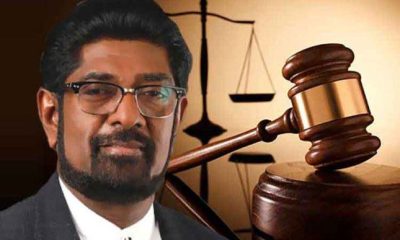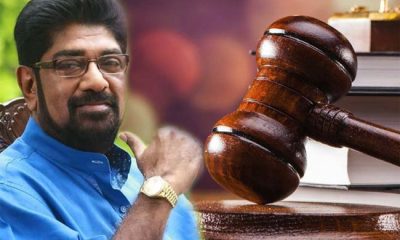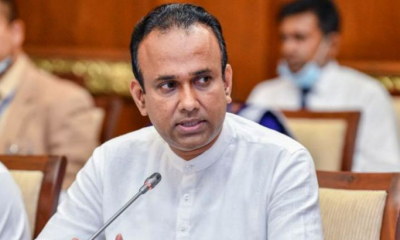Editorial
Keheliya’s exit and the upcoming budget

Last week’s removal of Health Minister Keheliya Rambukwella from his position was not altogether unexpected. True, he had predictably weathered a motion of no confidence in parliament last month after a three-day debate, thanks to the pohottuwa’s voting strength. Although he had the confidence of 113 members of the SLPP and a 40-vote majority, he obviously did not have the confidence of President Ranil Wickremesinghe who replaced him at the health ministry with Dr. Ramesh Pathirana, a qualified though non-practicing doctor. Whether Pathirana gladly accepted the assignment thrust upon him or not, the public will not know. But he seems to have successfully insisted that he remains Minister of Industries, part of his old portfolio, although he has divested himself of plantation industries for which he was previously responsible.
The Ministry of Health and the minister personally had been under sustained attack in the media and on the streets for a variety of reasons for the past several months. Among these was the alleged irresponsible import of substandard medicine and surgical equipment which had weakened the health sector and caused the death of several patients under treatment at state hospitals.
The main opposition alleged that the government continued to bring in low quality medicines and surgical equipment without complying with due procurement and registration processes on the excuse that compulsions of emergency purchases for urgent needs required lowering barriers. Rambukwella’s problems began way back in 2022 when a lot of noise was made about a visit he made to India to inspect a pharmaceutical factory from which Colombo intended to import medicines.
On that occasion, it was alleged that an Indian pharmaceutical company had funded the minister’s visit. He strongly denied these allegations saying a friend paid the expenses as his credit card had reached its weekly spending limit. He had since reimbursed the friend in cash upon landing in India. He told a Colombo news conference at his ministry that he had traveled to 86 countries, the first being to England with his parents an eight-year old, and was now holding his 17th passport.
He claimed he maintained close relations with travel companies as he was a frequent traveller and there were two of three companies that offered him massive discounts. As a cabinet minister, he could have used government funds for the trip but did not do so as the government had advised ministers to be economical in their spending. He also displayed a receipt at the press conference indicating that the payment for his ticket had been made by his friend and not a pharmaceutical company.
Rambukwella countered questions on his expertise on pharmaceuticals and their manufacture saying he took the chief executive officer of the National Medicines Regulatory Authority on this visit for this reason. He was quoted saying that when the country was spending 250 million dollars for purchases of medicine, did he not as health minister have the right to look into these industries, using his own funds? Whether the public, given its wide perceptions of politicians in general, would buy into the argument that they would spend out of pocket on public business, is another question. It will not be difficult to provide a near unanimous answer to that.
However that be, a legitimate question that can be posed to the president is that if Keheliya Rambukwella has proved himself a massive failure, as all the circumstantial evidence surrounding his departure from the health ministry suggests, then how good a job will he do at the environment ministry in which he has been found a comfort zone? The harsh reality is that the president, who to his credit has resisted massive pressure from the SLPP to expand the cabinet, is not strong enough to make a sacrificial lamb of the former health minister and has found him an alternative ministry without banishing him to the back bench.. Rambukwella, swallowing his pride – if he has any – has accepted. But is the overburdened taxpayer, already reeling under the weight of an unbearable cost of living, have any choice but pick up the tab.
President Wickremesinghe a few days ago told the UNP Convention that the presidential election followed by the parliamentary poll will be held the next year and the year after as decreed in the constitution. But the recent appointment of a Presidential Commission to report on prevailing election law and desirable changes have created fears that powers that be may be having some politricks up their sleeve to quote Mr. Neal de Alwis, a well known leftist of yesteryear. There is no doubt that the president has brought a semblance of stability to the country after last year’s chaos. But whether that can be sustained once Sri Lanka resumes paying its debts is an open question.
The Rajapaksas and their fellow travellers are now out of the woodwork. The president took a couple of them to the UN general assembly in September despite ours being a bankrupt nation. Namal Rajapaksa and SLPP General Secretary Sagara Kariyawasam last week, in effect, took the president to task over the recent cabinet changes. This provoked Nimal Lanza, a pro-Ranil SLPPer to loudly proclaim that Namal and Sagara are free to defeat next month’s budget, if they dare, and force a parliamentary election.
We no doubt live in interesting times. Whatever next month’s budget brings, it will not be sunshine. More hardships are inevitable and concessions to meet mounting demands without money printing will be impossible. The president as finance minister and the government locked into an agreement with the IMF will have to walk an impossible tightrope. Whatever happens, hopefully the next few months will see the election which is the rightful due of the people.
Editorial
Danger of weak drug regulation

Monday 22nd December, 2025
Maan Pharmaceuticals Ltd., the manufacturer of Ondansetron, which has been withdrawn from hospitals here pending a probe, is reported to have asked the Sri Lankan health authorities to have the drug tested by an internationally accredited laboratory. The use of nine other Maan products too has been suspended in Sri Lanka over quality concerns. Maan’s reaction has come as no surprise; all companies ardently defend their products. However, its concerns should be heeded. The National Medicines Regulatory Authority (NMRA) and the Ministry of Health ought to furnish irrefutable evidence in support of their decision to suspend the use of the drugs at issue. The manner in which the NMRA has carried out its duties and functions, especially granting approval for drugs and investigating complaints of their quality, over the years, does not inspire public trust.
The subtext of what has been reported of the Maan’s letter to the Sri Lankan health authorities is worth taking note of. It can be argued that in corporate newspeak, Maan has questioned the competence of the NMRA to test its products. As Maan would have us believe that its products meet international standards, it should be asked to state whether it has gained access to stringent regulatory destinations, such as the US and EU, and, if not, why.
It is being argued in some quarters that the degradation of pharmaceuticals can happen due to improper storage and transport. Maan’s aforesaid letter reportedly has reference to drug storage here. There are allegations that the Sri Lankan health authorities leave imported drugs in freight containers under inappropriate conditions for extended periods. However, the phials of Ondansetron which were tested at the Kandy National Hospital and found to be affected by microbial contamination had been stored properly and their seals were intact, according to media reports, quoting doctors. Thus, the contamination of the drug points to issues in manufacturing and packaging rather than storage and transport.
Meanwhile, a news item in this newspaper today reveals the pivotal importance the pharmaceutical industry has assumed in the Indian economy; India’s pharmaceutical exports have crossed USD 30 billion. Therefore, some critics of the Indian pharmaceutical products are of the view that India will do everything in its power to protect the interests of its drug companies, including Maan. But the fact remains that India itself has cracked down on some of its pharmaceutical companies involved in scandals. It severely dealt with the Indian companies that manufactured contaminated cough syrups which killed 66 children in Gambia in 2022 and 22 children in India in September 2025.
In the greed-driven corporate world, profits take precedence over human life, and there is hardly anything that Big Pharma spares in pursuing profit maximisation. As we pointed out in a previous comment, the World Health Organization has revealed that at least one in 10 medical products in low-and middle-income countries fails to meet quality standards or is falsified. This shows the enormity of the problem of fake and substandard drugs. Hence the need for robust mechanisms to protect patients.
All issues related to substandard and falsified drugs and their adverse effects in this country boil down to the failure of successive governments to address multiple problems pertaining to drug regulation and testing and find long-term solutions. Flaws in regulatory oversight and the absence of proper testing facilities have helped corrupt politicians and bureaucrats enrich themselves by turning this country into a dumping ground for poor-quality and fake medicines. Health Minister Dr. Nalinda Jayatissa himself has said that not all drugs approved by the NMRA undergo rigorous testing, and thorough tests are conducted on drugs only when there are complaints about their quality.
Most of all, the NMRA has to be cleansed, as a national priority. Its history is replete with numerous scandals, including allegations of corrupt drug registrations, data manipulation, issues with substandard and fake medicines leading to patient deaths prompting investigations, suspensions, legal action, and internal turmoil with officials resigning amidst claims of threats and cover-ups.
Editorial
Misplaced priorities

Sri Lanka has a very ‘promising’ government and a perennially protesting Opposition. The government makes various promises, which are like piecrusts made to be broken. The Opposition in a perpetual state of agitation bursts into protests at the drop of a hat. The two sides have been clashing in Parliament instead of sinking their political differences and cooperating at least in the aftermath of a disaster.
The Opposition has requested Speaker Dr. Jagath Wickramaratne to appoint a Parliamentary Select Committee (PSC) to probe the government’s alleged failure to mitigate the impact of Cyclone Ditwah despite repeated warnings issued by the Meteorology Department and the Irrigation Department. The government is determined to avoid a fate similar to that which befell the Yahapalana government following the Easter Sunday terror attacks, which became the undoing of that dysfunctional regime. It is therefore very unlikely to meet the Opposition’s demand at issue. Even if it agrees to appoint a PSC to probe its own alleged lapses, by any chance, it will not allow an Opposition MP to chair the committee and will go all out to frustrate its rivals’ efforts to ruin its political future.
Interestingly, some of the key Opposition members are former Yahapalana MPs who sought to derail a PSC probe into the 2015 Treasury bond scam. They craftily appointed a member of the JVP, which was a Yahapalana partner in all but name, as the Chairman of that PSC, and incorporated a slew of footnotes into the committee report in a bid to dilute it.
In this country, PSCs rarely help get to the bottom of the issues they probe. The PSC on the Treasury bond scam went out of its way to clear the then Prime Minister Ranil Wickremesinghe’s name, and helped the UNP scapegoat former Central Bank Governor Arjuna Mahendran and throw him to the wolves. In 2012, Mahinda Rajapaksa government turned a PSC probe into a witch-hunt against then Chief Justice Dr. Shirani Bandaranayake, who was subsequently wrongfully impeached. The PSC that investigated the Easter Terror attacks (2019) gathered a lot of valuable information but its findings, conclusions and recommendations were tainted by a glaring political bias.
Going by the government’s determined bid to let its MP Asoka Ranwala off the hook, following a road accident, how ruthless the JVP-led NPP will be in warding off threats to its political survival is not difficult to imagine. The Opposition can go on shouting until it is blue in the face but it will not be able to have the government’s alleged failure to heed disaster warnings and save lives investigated properly as long as the JVP/NPP is in power.
What we are witnessing on the political front, especially in Parliament, is like a drunken brawl at a funeral. The government and the Opposition are fighting while the country is mourning those who perished in recent floods and landslides.
What the political parties represented in Parliament ought to do at this juncture is to get their priorities right. They must stop clashing and make a concerted effort to carry out post-disaster rebuilding operations and strengthening the economy. They must not lose sight of the rapid depreciation of the rupee, and the disconcerting forecasts of an economic slowdown. The much-advertised revenue bubble, created by an unprecedented increase in vehicle imports, is about to burst, and the possibility of the country having a rupee crisis to contend with again cannot be ruled out. Foreign reserve targets are far from achieved, and there is a pressing need to boost the forex inflow and ensure that the country will be able to honour its pledge to resume foreign debt repayment in 2028.
All political parties have done precious little for the disaster victims. They have been only visiting the welfare centres and distributing relief materials collected from the considerate public. They ought to engage in post-disaster rebuilding actively. Reconstruction is a labour-intensive task. The self-righteous political leaders should mobilise their community level organisation for post-disaster rebuilding. Sadly, they have not even helped clean flood-hit houses.
Editorial
Cops as whipping boys?

Saturday 20th December, 2025
Disciplinary action has reportedly been taken against several police officers for their alleged failure to conduct a proper investigation into a recent accident caused by NPP MP Asoka Ranwala in Sapugaskanda. This move, we believe, has the trappings of a diversionary tactic. The police would have incurred the wrath of the government if they had conducted a breathalyzer test on Ranwala and produced him before a Judicial Medical Officer immediately after the crash where an infant, his mother and grandmother were injured.
Ranwala was subjected to a blood alcohol test more than 12 hours after the accident, according to media reports. The police would not have dragged their feet of their own volition. They were obviously made to do what they did. The law applies equally only to ordinary people. Will the police top brass explain why no disciplinary action was taken against the police officers who unashamedly sided with a group of JVP members involved in grabbing an office of the Frontline Socialist Party (FSP) in Yakkala in September 2025. After turning a blind eye to that blatant transgression, the police provided security to the JVP members who were forcibly occupying the FSP office. Thankfully, a judicial intervention made them leave the place. The current rulers claim they have not placed themselves above the law, unlike their predecessors. A wag says they have placed the law below them instead!
Having made a mockery of its much-advertised commitment to upholding the rule of law by intervening to prevent Ranwala from undergoing an alcohol test immediately after the aforesaid accident, the government is making attempts at face-saving. Curiously, blood samples obtained from Ranwala have been sent to the Government Analyst for testing! The government seems to have a very low opinion of the intelligence of the public, who voted for it overwhelmingly, expecting a ‘system change’.
It is being argued in some quarters that the disciplinary inquiry against the police officers has been scripted, and the charges against them will be dropped when the issue fizzles out. This argument is not without some merit, but there is a possibility of the government going to the extent of trying to clear its name at the expense of the police officers concerned if push comes to shove.
Successive governments have scapegoated police personnel and other state employees to safeguard their interests, and the incumbent administration is no exception; it has already sought to shift the blame for its failure to mitigate the impact of Cyclone Ditwah to the Meteorological Department, which, it has claimed, did not warn it about the extreme weather events fairly in advance. Opposition Leader Sajith Premadasa told Parliament on Thursday that the government had muzzled some senior officials of the Meteorological Department.
Some leaders of the incumbent government are bound to face legal action for their commissions and omissions when they lose power, and the state officials pandering to their whims and fancies will have to do likewise.
The public officials who are at the beck and call of politicians and carry out illegal orders should realise that they run the risk of being left without anyone to turn to in case they have to face legal action for their transgressions. Their ruthlessly self-seeking political masters will not scruple to sacrifice them.
-

 Midweek Review5 days ago
Midweek Review5 days agoHow massive Akuregoda defence complex was built with proceeds from sale of Galle Face land to Shangri-La
-

 News4 days ago
News4 days agoPope fires broadside: ‘The Holy See won’t be a silent bystander to the grave disparities, injustices, and fundamental human rights violations’
-

 News4 days ago
News4 days agoPakistan hands over 200 tonnes of humanitarian aid to Lanka
-

 News5 days ago
News5 days agoBurnt elephant dies after delayed rescue; activists demand arrests
-

 Business3 days ago
Business3 days agoUnlocking Sri Lanka’s hidden wealth: A $2 billion mineral opportunity awaits
-

 Editorial5 days ago
Editorial5 days agoColombo Port facing strategic neglect
-

 News3 days ago
News3 days agoArmy engineers set up new Nayaru emergency bridge
-

 News5 days ago
News5 days agoSri Lanka, Romania discuss illegal recruitment, etc.























